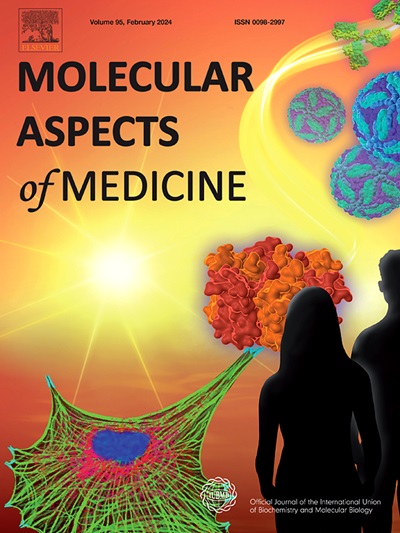Frustration in physiology and molecular medicine
IF 10.3
2区 医学
Q1 BIOCHEMISTRY & MOLECULAR BIOLOGY
引用次数: 0
Abstract
Molecules provide the ultimate language in terms of which physiology and pathology must be understood. Myriads of proteins participate in elaborate networks of interactions and perform chemical activities coordinating the life of cells. To perform these often amazing tasks, proteins must move and we must think of them as dynamic ensembles of three dimensional structures formed first by folding the polypeptide chains so as to minimize the conflicts between the interactions of their constituent amino acids. It is apparent however that, even when completely folded, not all conflicting interactions have been resolved so the structure remains ‘locally frustrated’. Over the last decades it has become clearer that this local frustration is not just a random accident but plays an essential part of the inner workings of protein molecules. We will review here the physical origins of the frustration concept and review evidence that local frustration is important for protein physiology, protein-protein recognition, catalysis and allostery. Also, we highlight examples showing how alterations in the local frustration patterns can be linked to distinct pathologies. Finally we explore the extensions of the impact of frustration in higher order levels of organization of systems including gene regulatory networks and the neural networks of the brain.
生理学和分子医学的挫折
分子提供了必须理解生理学和病理学的终极语言。无数的蛋白质参与复杂的相互作用网络,并执行协调细胞生命的化学活动。为了完成这些经常令人惊奇的任务,蛋白质必须移动,我们必须把它们看作是首先通过折叠多肽链形成的三维结构的动态集合,以尽量减少其组成氨基酸相互作用之间的冲突。然而,很明显,即使完全折叠,也不是所有冲突的相互作用都得到解决,所以结构仍然“局部受挫”。在过去的几十年里,人们越来越清楚地认识到,这种局部的挫折不仅仅是一个偶然的事故,而是蛋白质分子内部运作的重要组成部分。我们将在这里回顾挫折概念的物理起源,并回顾局部挫折对蛋白质生理学、蛋白质识别、催化和变构的重要证据。此外,我们强调了一些例子,表明局部挫折模式的改变如何与不同的病理相关联。最后,我们探讨了挫折在包括基因调控网络和大脑神经网络在内的高阶系统组织中的影响扩展。
本文章由计算机程序翻译,如有差异,请以英文原文为准。
求助全文
约1分钟内获得全文
求助全文
来源期刊

Molecular Aspects of Medicine
医学-生化与分子生物学
CiteScore
18.20
自引率
0.00%
发文量
85
审稿时长
55 days
期刊介绍:
Molecular Aspects of Medicine is a review journal that serves as an official publication of the International Union of Biochemistry and Molecular Biology. It caters to physicians and biomedical scientists and aims to bridge the gap between these two fields. The journal encourages practicing clinical scientists to contribute by providing extended reviews on the molecular aspects of a specific medical field. These articles are written in a way that appeals to both doctors who may struggle with basic science and basic scientists who may have limited awareness of clinical practice issues. The journal covers a wide range of medical topics to showcase the molecular insights gained from basic science and highlight the challenging problems that medicine presents to the scientific community.
 求助内容:
求助内容: 应助结果提醒方式:
应助结果提醒方式:


